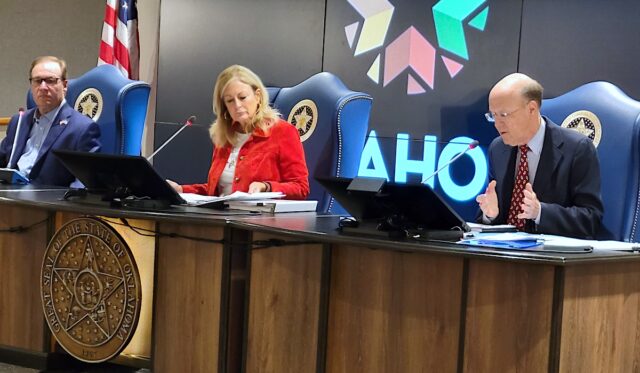
The Oklahoma Supreme Court has struck down an Oklahoma Corporation Commission order that prohibited utility companies from billing customers for any franchise fees, municipal fees and any other taxes allowed by state law on costs related to Winter Storm Uri, the 14-day megastorm that struck the region in February 2021. The total fiscal impact of the new decision is unknown, but OCC Commissioner Bob Anthony — who dissented in the August 2022 final order — said about $60 million to $100 million is owed to cities and towns from unpaid franchise fees and municipal taxes.
Released Wednesday, one day after voters declined to retain one Supreme Court justice and narrowly retained two others, the high court’s ruling said the Corporation Commission lacked the authority to say municipalities could not collect franchise percentage-based fees and taxes from an electric or gas utility’s securitized debt. While that determination may ultimately be up to a district court, the matter has been sent back to the OCC.
The OCC’s now-defunct order was challenged by the City of Oklahoma City and the Oklahoma Municipal League in September 2022. Underscoring concerns about the speed with which the Oklahoma Supreme Court operates, the case’s final arguments and briefs were submitted in November 2023. A full year later, the court held 8-0 that the OCC order was invalid.
Narrowly retained by voters Tuesday, Justice James E. Edmondson wrote the majority opinion, saying the effect of the Corporation Commission’s order “made these franchise fees and taxes related to extraordinary fuel costs to be unlawful” for the purpose of commission-approved utility tariffs because of the Regulated Utility Consumer Protection Act.
“We also conclude the commission’s determination that the February 2021 Regulated Utility Consumer Protection Act changed, amended or altered a utility’s legal obligations concerning municipal franchise fees and gross receipts taxes is a determination not sustained by law and must be reversed,” Edmondson wrote.
Vice Chief Justice Dustin P. Rowe wrote a concurring opinion in the 8-0 decision, which saw Justice Dana Kuehn not participate. In his concurring opinion, Rowe empathized with utility customers.
“I write separately to highlight the question that is unspoken: How much more money will ratepayers be required to pay for the 14-day winter storm that occurred in 2021?” Rowe wrote. “Today, nearly four years after the 14-day winter storm, it remains to be seen whether municipalities will receive their franchise fees and taxes. And, if municipalities are entitled to be paid — and if not from the securitized revenue — it remains to be seen whether the ratepayer will have to cough up more money to pay for this colossal financial event. Although beyond our purview, I cannot help but wonder how many of these catastrophic weather events Oklahoma ratepayers can afford — and what, if anything — has been done to prevent this from happening again.”
Christian Rinehart, deputy general counsel for the Oklahoma Municipal League, said the organization is encouraged by the high court’s decision.
“Franchise fees and gross receipts taxes owed to municipalities under contractual legal obligations were protected,” he said. “The once-in-a-generation 2021 winter storm negatively impacted the state of Oklahoma, its citizens, utility companies and municipalities.”
Kristy Yager, a spokeswoman for the City of Oklahoma City, said the city does not comment on pending litigation. In 2006, OKC voters approved a 25-year franchise agreement with OG&E that includes a 3 percent fee on gross revenue from the utility’s sale of electricity within city limits.
Oklahoma Corporation Commissioner Todd Hiett, who along with former Commissioner Dana Murphy voted for the order, said Thursday, “I can’t comment because it will be a pending case.”
Anthony, whose 36-year run on the OCC will end in January because of term limits, said in a statement: “It is noteworthy that when the Oklahoma Supreme Court was not legislatively limited in its judicial review of this OCC order which improperly waived utility company tariffs and violated contract rights in response to the 2021 winter storm, the court found the OCC’s order was ‘not sustained by law and must be reversed. We can only imagine what the court might have done to the OCC’s multi-billion-dollar winter storm bond financing orders if it had not been prevented from considering the protests filed in those cases, some of which made substantially the same legal arguments.”
Aaron Cooper, manager of corporate communications for OG&E, said the utility is still reviewing the Supreme Court’s decision.
“It appears that the matter will now return to the Oklahoma Corporation Commission for further proceedings and there should be no impact on customers until those further proceedings conclude,” Cooper said. “We will continue to communicate with our customers as the commission deliberates further.”
Matt Rahn, PSO’s regional communications manager, said the company is “reviewing the decision to determine what is required to comply with the decision.”
‘A determination beyond the Corporation Commission’s authority’

Winter Storm Uri brought record-cold temperatures to Oklahoma and a shortage of natural gas that utilities needed to provide to keep customers warm. Natural gas prices skyrocketed, and utility companies had to pay extremely high prices, which exceeded their entire fuel acquisition costs for all of 2020. Oklahoma’s largest utilities spent about $3 billion for fuel and purchased power costs. To address the situation, the Oklahoma Legislature passed the Regulated Utility Consumer Protection Act, which authorized the issuance of ratepayer-backed bonds that allow customers to repay the increased costs on their monthly utility bills for more than two decades. Without securitizing the debt, utilities would have taken out their own loans at higher interest rates, resulting in steeper payments for customers.
In his concurring opinion, Rowe noted how utility companies filed for relief under the Regulated Utility Consumer Protection Act and how financing orders were subsequently issued by the Corporation Commission. The Supreme Court reviewed and approved the utility company bonds.
“In each, I concurred in the court’s judgment, but wrote separately to address the nature of the proceedings and highlight the debt that would fall onto the shoulders of the people of Oklahoma over the next 28 years,” Rowe said.
In July 2022, the OCC’s public utilities division filed an application asking the commission to prevent certain regulated utilities from billing customers for any franchise fees, municipal fees or taxes on the ratepayer-backed bond payments dedicated to paying off the exorbitant fuel costs incurred during Winter Storm Uri. Commissioners Todd Hiett and Dana Murphy voted to approve the request, with Anthony dissenting.
“The Corporation Commission’s order effectively held franchise fees, municipal fees or taxes, and/or [Title 68, Section 2601] taxes related to the winter storm were not owed — a determination beyond the Corporation Commission’s authority,” Rowe wrote.
Rowe said the Regulated Utility Consumer Protection Act “is silent on whether franchise fees and related taxes are excluded or included as costs or expenses of a utility company providing fuel during the winter storm.”
Cities charge gas and electric utilities a “franchise fee” as a type of rent for the use of public streets and other rights-of-way. Typically, franchise fee rates are 2 to 3 percent and run for 25 years after receiving voter approval. Under the Oklahoma Constitution, franchise agreements are required to go to a vote of the people, although in January a Cleveland County District Court judge ruled that voters’ rejection of an OG&E franchise agreement in Norman functionally meant nothing because an “implied contract” exists between the city and the utility.
In his concurrent opinion, Rowe peppered the public with unanswered questions about franchise agreements.
“Are the franchise fees and related taxes based upon the winter storm owed to municipalities under the February 2021 Regulated Utility Consumer Protection Act? Are franchise fees and related taxes based upon the winter storm owed under a utility company’s respective franchise agreement?” Rowe asked. “If so, who is paying the franchise fees associated with the winter storm? Will payment be made from the securitized revenue or from the utility companies’ balance sheets? I suppose the answer to these questions will be litigated in the district court. From there, the district court can determine whether the burden of an additional $60-100 million will fall onto the people of Oklahoma.”
In his majority opinion, Edmondson quoted from a transcript of an Aug. 11, 2022, OCC hearing in which a commissioner said franchise fees are tied to, or contingent upon, fuel costs approved by the commission for ratepayer payment.
“I think for the most part, the franchise agreements are specific, that it has to be a charge passed along to the ratepayer by the utility that has been approved by the commission. In this case, there was never a fuel adjustment clause, which would have been the normal process in that,” the unnamed commissioner was quoted as saying. “We never authorized the utilities to collect that fuel cost until we took it out and put it over into a securitization bucket, at which time it’s no longer the property of the utilities (…) [O]ur role is to authorize the utilities or not authorize the utilities for collection from the ratepayers. In this case, we never authorized the utilities to collect those fuel costs because that never even became an issue because we went a different direction and we placed it into a securitization bucket.”
The Oklahoma Municipal League, which represents cities and towns at the State Capitol, argued to the Supreme Court that if a municipality improperly assessed “some huge finance — franchise fee” and a utility objected, then “[t]hey need to take that to district court [because] whether or not that is in accordance with the agreement in Oklahoma is not within the jurisdiction of this commission to determine,” according to Edmondson’s opinion.
The OML also said it was concerned the OCC was becoming involved in the terms of franchise agreements between local governments and the utilities.
In the OCC’s final order, commissioners said their “exclusive authority” for utility ratemaking justified their decision.
“The commission agrees that it does not have jurisdiction related to the contractual terms of such agreements,” the order stated. “However. the commission is vested with the exclusive authority with respect to the ratemaking of utilities and the charges they seek to collect from their ratepayers concerning franchise-related payments.”
In their petition filed with the Supreme Court in September 2022, lawyers for the City of Oklahoma City and A New Energy, LLC, said the OCC has the constitutional and statutory authority to approve expenses to be billed to ratepayers, “but in this instance is using that authority to determine the validity of taxes and franchise fees assessed by municipalities. This review of taxes and fees are beyond the commission’s jurisdiction.”
Meanwhile, Corporation Commission delays action on OG&E rate settlement
During their meeting Oct. 30, commissioners put off approving a final element of a pending $126.6 million rate hike for OG&E. Hiett and Anthony each said they could not support the order proposed by OCC Chairwoman Kim David to approve the OG&E settlement, but for different reasons.
Hiett questioned whether OG&E should be allowed to continue subsidizing the rates paid by the utility’s large customers who use one megawatt of electricity or more. Anthony argued the matter shouldn’t be taken up because a writ of prohibition is pending in the Oklahoma Supreme Court to ban Hiett from voting on cases involving employees of companies who were affected by Hiett’s alleged inappropriate behavior.
Oral arguments are scheduled Nov. 12 in the case, which claims Hiett should not act on certain utility cases because he allegedly groped a man, who reportedly works at a company regulated by OCC, during a conference in Minnesota this summer and because of other allegations against him. A pair of Kansas Corporation Commission employees made written reports alleging that an “extensively intoxicated” Hiett repeatedly rubbed the man’s arm and crotch in a group setting. (Hiett has said he has no memory of the incident owing to his struggles with alcohol, for which he is pursuing treatment.)
OG&E’s pending settlement, which is lower than its original $332.5 million rate request, would reduce the increase of their customers’ average monthly residential bill from $19.02 to $9.58. Although it is awaiting final approval, the rate increase went into effect for OG&E customers in June. The OCC commissioners are reviewing the rates the utility charges its customers using one megawatt of electricity or more outside OG&E’s service area.
The Oklahoma Association of Electric Cooperatives has argued that OG&E is not charging its actual cost to serve the one-megawatt customers, which are mostly oil and gas operations. Some of the uncertainty stems from a state law, created by House Bill 2845 in 2023, that requires utilities to establish rates for one-megawatt customers and avoid unfairly shifting costs to residential customers. The law took effect Nov. 1, 2023, after OG&E filed its rate increase proposal. OG&E has said the law does not apply because it deals with one-megawatt customers seeking service after Nov. 1, 2023.
Hiett said there were about 30 OG&E one-megawatt customers outside its service area between 2014 and when the new law took effect. Two other large customers have struck power agreements with OG&E since the law took effect. Hiett said it’s estimated about $5.5 million of those customers’ rates are subsidized by other customers, such as residential and business customers. He said those rates should not be subsidized, which would lower the rates charged to the other customers. Rates of other customers would not be reduced by much. One estimate is that it would lower the average residential customer’s bill by a quarter.
“It will not adjust them downward to a large amount, but it’s still the right thing to do,” Hiett said.
David said she was hesitant to restructure the rates for the one-megawatt customers.
“I have some concern about if we go back and try to recategorize the customers between 2014 and 2023, that that goes really against the agreement that was made with the Legislature at the time, and (…) what we’d end up having to do is to reassess a different cost structure for them,” she said.
David said that would result in a hardship for the one-megawatt customers because their electricity rates likely would increase and they have no other options in the market.





















